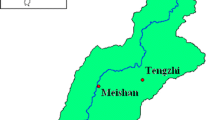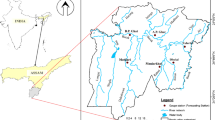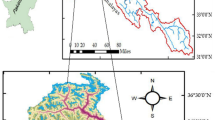Abstract
The complex nature of hydrological phenomena, like rainfall and river flow, causes some limitations for some admired soft computing models in order to predict the phenomenon. Evolutionary algorithms (EA) are novel methods that used to cover the weaknesses of the classic training algorithms, such as trapping in local optima, poor performance in networks with large parameters, over-fitting, and etc. In this study, some evolutionary algorithms, including genetic algorithm (GA), ant colony optimization for continuous domain (ACOR), and particle swarm optimization (PSO), have been used to train adaptive neuro-fuzzy inference system (ANFIS) in order to predict river flow. For this purpose, classic and hybrid ANFIS models were trained using river flow data obtained from upstream stations to predict 1-, 3-, 5-, and 7-day ahead river flow of downstream station. The best inputs were selected using correlation coefficient and a sensitivity analysis test (cosine amplitude). The results showed that PSO improved the performance of classic ANFIS in all the periods such that the averages of coefficient of determination, R2, root mean square error, RMSE (m3/s), mean absolute relative error, MARE, and Nash-Sutcliffe efficiency coefficient (NSE) were improved up to 0.19, 0.30, 43.8, and 0.13%, respectively. Classic ANFIS was only capable to predict river flow in 1-day ahead while EA improved this ability to 5-day ahead. Cosine amplitude method was recognized as an appropriate sensitivity analysis method in order to select the best inputs.










Similar content being viewed by others
References
Aytek A, Kisi O (2008) A genetic programming approach to suspended sediment modeling. J Hydrol 351:288–298
Azad A, Karami H, Farzin S, Saeedian A, Kashi H, Sayyahi F (2018) Prediction of water quality parameters using ANFIS optimized by intelligence algorithms (case study: Gorganrood River). KSCE J Civ Eng 22(7):2206–2213
Basser H, Karami H, Shamshirband S h, Akib S, Amirmojahedi M, Ahmad R, Jahangirzadeh A, Javidnia H (2015) Hybrid ANFIS–PSO approach for predicting optimum parameters of a protective spur dike. Appl Soft Comput 30:642–649
Chang FJ, Chang YT (2006) Adaptive neuro-fuzzy inference system for prediction of water level in reservoir. Adv Water Resour 29:1–10
Chang FJ, Chen YC (2001) A counter propagation fuzzy-neural network modeling approach to real time stream flow prediction. J Hydrol 245:153–164
Chau KW (2007) A split-step particle swarm optimization algorithm in river stage forecasting. J Hydrol 346(3–4):131–135
Cheng CT, Wu XY, Chau KW (2005) Multiple criteria rainfall–runoff model calibration using a parallel genetic algorithm in a cluster of computers. Hydrol Sci J 50(6):2150–3435
Cheng CT, Niu WJ, Feng ZK, Shen JJ, Chau KW (2015) Daily reservoir runoff forecasting method using artificial neural network based on quantum-behaved particle swarm optimization. Water 7:4232–4246
Dorigo M (1992) Optimization, learning and natural algorithms. Ph.D Thesis, Dipartimento di Elettronica. Politecnico di Milano, Italy, p 23
Drecourt JP (1999) Application of neural networks and genetic programming to rainfall runoff modeling. D2K Technical Report 0699-1-1. Danish Hydraulic. Institute, Denmark
Eberhart R, Kennedy J (1995) Particle swarm optimization. IEEE Int Conf 4:1942–1948
Elbeltagi E, Hegazy T, Grierson D (2005) Comparison among five evolutionary-based optimization algorithms. Adv Eng Inform 19:43–53
Firat M (2008) Comparison of artificial intelligence techniques for river flow forecasting. Hydrol Earth Syst Sci 12:123–139
Firat M, Gungor M (2007) River flow estimation using adaptive neuro fuzzy inference system. Math Comput Simul 75:87–96
Fotovatikhah F, Herrera M, Shamshirband S, Chau KW, Faizollahzadeh-Ardabili S, Piran MJ (2018) Survey of computational intelligence as basis to big flood management: challenges, research directions and future work. Engineering Applications of Computational Fluid Mechanics 12(1):411–437
Gholami V, Chau KW, Fadaee F, Torkaman J, Ghaffari A (2015) Modeling of groundwater level fluctuations using dendrochronology in alluvial aquifers. J Hydrol 529:1060–1069
Gholami A, Bonakdari H, Ebtehaj I, Akhtari AA (2017) Design of an adaptive neuro-fuzzy computing technique for predicting flow variables in a 90° sharp bend. J Hydroinf 19(4):572–585
Gopakumar R, Kaoru T, James EJ (2007) Hydrologic data exploration and river flow forecasting of a humid tropical river basin using artificial neural networks. Water Resour Manag 21(11):1915–1940. https://doi.org/10.1007/s11269-006-9137-9
Hasanipanah M, Noorian-Bidgoli M, Jahed-Armaghani D, Khamesi H (2016) Feasibility of PSO-ANN model for predicting surface settlement caused by tunneling. Eng Comput 32(4):705–715
Holland JH (1975) Adaptation in nature and artificial systems. University of Michigan Press, Michigan
Jalal-Kamali A (2015) Using of hybrid fuzzy models to predict spatiotemporal groundwater quality parameters. Earth Sci Inf. https://doi.org/10.1007/s12145-015-0222-6
Jang JR (1993) ANFIS: adaptive-network-based fuzzy inference system. IEEE TransSyst Man Cybernet 23:665–685
Jang JSR, Sun CT (1993) Functional equivalence between radial basis function networks and fuzzy inference systems. IEEE Trans Neural Netw 4(1):156–159
Kachitvichyanukul V (2012) Comparison of three evolutionary algorithms: GA, PSO and DE. Industrial Engineering and Management Systems 11(3):215–223
Karimi S, Shiri J, Kisi O, Xu T (2018) Forecasting daily streamflow values: assessing heuristic models. Hydrol Res 49(3):658–669
Kisi, O., Shiri, J., & Demir, V. (2017). Hydrological time series forecasting using three different heuristic regression techniques. In Handbook of Neural Computation (pp. 45–65).
Mirrashid M (2014) Earthquake magnitude prediction by adaptive neuro-fuzzy inference system (ANFIS) based on fuzzy C-means algorithm. Nat Hazards 74(3):1577–1593
Peyghami MR, Khanduzi R (2012) Predictability and forecasting automotive price based on a hybrid train algorithm of MLP neural network. Neural Comput Applic 21(1):125–132
Peyghami MR, Khanduzi R (2013) Novel MLP neural network with hybrid tabu search algorithm. Neural Network World 3(13):255–270
Pramanik N, Panda RK (2009) Application of neural network and adaptive neuro fuzzy inference systems for river flow prediction. Hydrol Sci J 54(2):247–260
Rezaei F, Safavi HR, Ahmadi A (2013) Groundwater vulnerability assessment using fuzzy logic: a case study in the Zayandehrood aquifers, Iran. Environ Manag 51:267–277
Rezapour-Tabari MM (2016) Prediction of river runoff using fuzzy theory and direct search optimization algorithm coupled model. Arab J Sci Eng 41(10):4039–4051
Safavi HR, Ahmadi KM (2015) Prediction and assessment of drought effects on surface water quality using artificial neural networks: case study of Zayandehrud River, Iran. J Environ Health Sci Eng 13(1):68. https://doi.org/10.1186/s40201-015-0227-6.
Salimi A, Karami H, Farzin S, Hassanvand M, Azad A, Kisi O (2018) Design of water supply system from rivers using artificial intelligence to model water hammer. ISH Journal of Hydraulic Engineering. https://doi.org/10.1080/09715010.2018.1465366
Sanikhani H, Kisi O (2012) River flow estimation and forecasting by using two different adaptive neuro-fuzzy approaches. Water Resour Manag 26(6):1715–1729. https://doi.org/10.1007/s11269-012-9982-7
Savic AD, Walters AG, Davidson JW (1999) A genetic programming approach to rainfall-runoff modeling. Water Resour Manag 13:219–231
Shihabudheen KV, Pillai GN (2018) Recent advances in neuro-fuzzy system: a survey. Knowl-Based Syst. https://doi.org/10.1016/j.knosys.2018.04.01
Shiri J, Kisi O (2010) Short-term and long-term streamflow forecasting using a wavelet and neuro-fuzzy conjunction model. J Hydrol 394(3–4):486–493
Shiri J, Kisi O (2011) Comparison of genetic programming with neuro-fuzzy systems for predicting short-term water table depth fluctuations. Comput Geosci 37(10):1692–1701. https://doi.org/10.1016/j.cageo
Socha K, Dorigo M (2008) Ant colony optimization for continuous domains, Eur. J Oper Res 185:1155–1173
Svensson C (2016) Seasonal river flow forecasts for the United Kingdom using persistence and historical analogues. Hydrol Sci J 61(1):19–35
Taormina R, Chau KW, Sivakumar B (2015) Neural network river forecasting through baseflow separation and binary-coded swarm optimization. J Hydrol 529:1788–1797
Wu CL, Chau KW (2011) Rainfall–runoff modeling using artificial neural network coupled with singular spectrum analysis. J Hydrol 399(3-4):394–409
Acknowledgements
The authors would like to thank the Esfahan Regional Water Authority for providing the necessary data to carry out this investigation.
Author information
Authors and Affiliations
Corresponding author
Rights and permissions
About this article
Cite this article
Azad, A., Farzin, S., Kashi, H. et al. Prediction of river flow using hybrid neuro-fuzzy models. Arab J Geosci 11, 718 (2018). https://doi.org/10.1007/s12517-018-4079-0
Received:
Accepted:
Published:
DOI: https://doi.org/10.1007/s12517-018-4079-0




